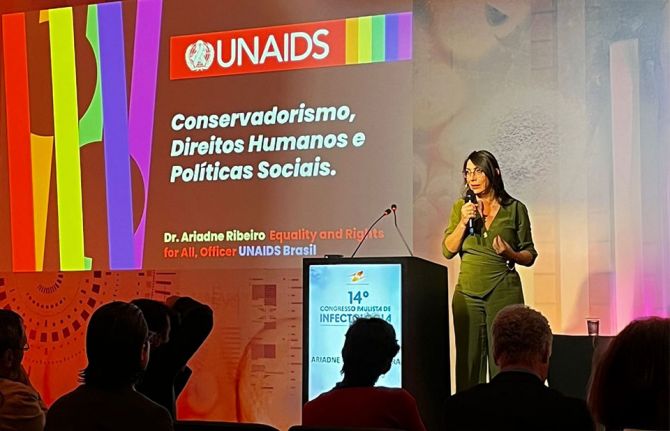

L to R: UNAIDS Executive Director, Michel Sidibé; UNEG Chair and Director of the Inspection and Evaluation Division, Office of Internal Oversight Services, Deborah Rugg; Permanent Secretary, Office of the Prime Minister of Uganda, Pius Bigirimana; Under-Secretary-General, Office of Internal Oversight Services, Carman Lapointe; and Director for Country, Corporate and Global Evaluations, World Bank, Nick York. Credit: UN/M.Reber
Feature Story
High-level panel reviews how the United Nations is measuring results
18 April 2013
18 April 2013 18 April 2013As part of the evaluation week organized by the United Nations Evaluation Group (UNEG) taking place from 15 - 19 April 2013 at the UN Headquarters in New York, a high-level panel event, entitled “UN Results – Are we achieving them? How do we know?” discussed whether or not the United Nations is achieving its objectives.
The main issues addressed by the panel members included how evaluation is contributing to the measurement of the results; if evaluation findings and recommendations are actually used for programme and policy improvements; and how the collective capacity of UN programmes can be built to improve evaluation.
Delivering the opening remarks United Nations Secretary-General Ban Ki-moon emphasized how the evaluation of programmes is a critical function of the work of the UN. UNAIDS Executive Director, Michel Sidibé presented the experience of UNAIDS in carrying out monitoring and evaluation to effectively respond to the AIDS epidemic.
UNEG is an interagency network that brings together the evaluation units of the UN system, including UN departments, specialized agencies, funds and programmes, and affiliated organizations. It currently has 43 such members and three observers.
Quotes
How do we know if the United Nations is doing the right things? And how do we know we are doing these things right? These are the questions that evaluation is supposed to answer. Evaluation is not easy. Nor is it popular. But it is essential.
The progress towards halting and reversing the epidemic would never have begun if a solid monitoring and evaluation process had not been embedded in the programme. Wisdom starts by knowing the facts. We must make information user friendly for people and decision makers alike. Things are changing quickly and we need to move into an era of real time evaluation.
We need to go beyond 'symbolic evaluation'. Measuring impact requires focusing on where programs are delivered, that is, by the countries themselves.
We need to develop an evaluation culture. Evaluation has yet to become a fully robust and comprehensive function and integral to how a programme works. Evidence-based evaluation on programme performance must guide how programmes are designed and implemented.
Related
 Upholding dignity for everyone: Ariadne Ribeiro Ferreira
Upholding dignity for everyone: Ariadne Ribeiro Ferreira

21 November 2024

